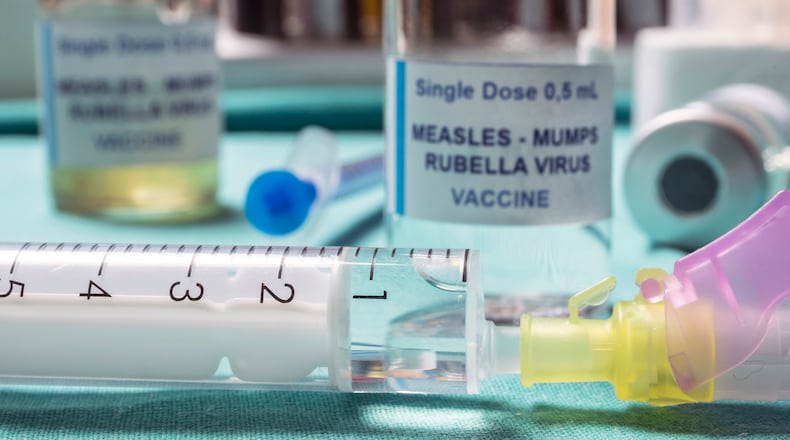The Georgia Department of Public Health confirmed a third case of measles in Georgia this year — an unvaccinated person traveling with an international group of students.
The individual, who does not live in the United States, is isolated and receiving treatment at a local hospital, according to a spokesperson for DPH.
DPH said it is working with the Centers for Disease Control and Prevention to identify and contact anyone who may have been exposed to the individual and to prevent further spread of measles. DPH declined to share details such as the age of this person or place of residence.
Earlier this year, state health officials confirmed two cases of measles in a metro Atlanta family after one of the family members had traveled internationally. Both of them were also unvaccinated.
Before this year, the last measles cases in Georgia were reported in 2020.
Measles is so contagious that if one person has it, up to 90% of the people close to that person who are not immune will also become infected, according to the CDC. Measles spreads through the air when an infected person coughs or sneezes. The virus can stay in the air or on surfaces for up to two hours after an infected person has left the room.
Measles symptoms appear 7 to 14 days after contact with the virus and typically include high fever, cough, runny nose, and watery eyes. The best known symptom is a rash of tiny red spots that typically start at the head and spread to the rest of the body.
Infected people can spread measles to others from four days before until four days after the rash appears, according to the CDC.
But the MMR (measles, mumps, rubella) vaccine, which is traditionally given to children, is very effective and can prevent illness. The CDC recommends children receive their first dose of MMR vaccine between 12 to 15 months of age and a second dose at 4 to 6 years old.
About 95% of the people who receive a single dose of MMR will develop immunity to all three viruses. A second dose boosts immunity, typically enhancing protection to 98%.
People with symptoms of measles should contact their health care provider immediately. They should not go directly to a doctor’s office or hospital without calling first to discuss symptoms and precautions to avoid spreading the illness to others.
With wide use of the vaccine, measles was declared eliminated in the U.S. in 2000. But in 2019, the U.S. saw nearly 1,300 measles cases across 31 states, making the highest number since 1992 and a record since measles was considered eliminated in the country. The 2019 outbreak in the U.S. included an outbreak of 11 cases in Cobb County, which was contained.
Since 2020, there have been between 13 and 121 measles cases in the U.S. annually, according to the CDC.
According to the CDC, most measles cases in the U.S. occur when unvaccinated or partially vaccinated Americans travel internationally, contract the disease, and then spread it to those who are unvaccinated after they return home. U.K. health officials have been urging millions of parents to book their children for missed MMR vaccines during a sharp increase in the number of measles cases there.
Other countries with ongoing measles outbreaks include Yemen, India and Ethiopia.
In Georgia, an estimated 88% of young children have received at least one dose of the recommended vaccination for measles, mumps and rubella, known as the “MMR” vaccine, according to the American Academy of Pediatrics. That coverage rate is down from 93% in 2019.
Because measles is so contagious, to ensure the whole community is protected requires that about 95% of the population be vaccinated, health officials say. The CDC estimates 91% of young children in the U.S. have gotten at least one dose of the MMR vaccine.
For more information about measles, log on to https://dph.georgia.gov/epidemiology/acute-disease-epidemiology/vaccine-preventable-diseases/measles or https://www.cdc.gov/measles/index.html.
About the Author
Keep Reading
The Latest
Featured



